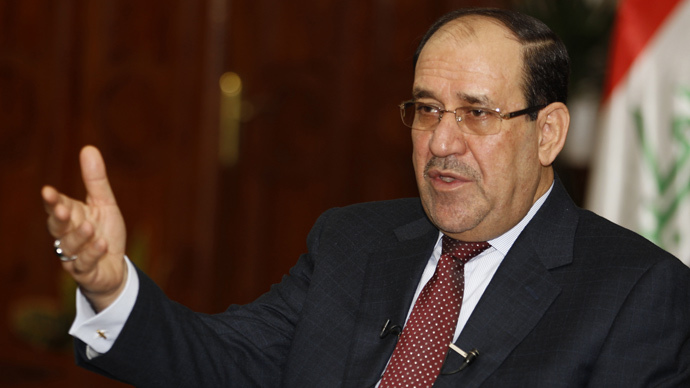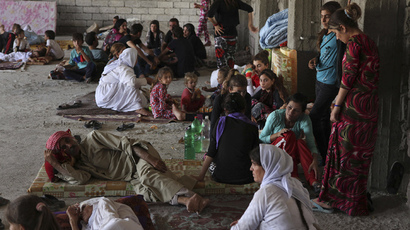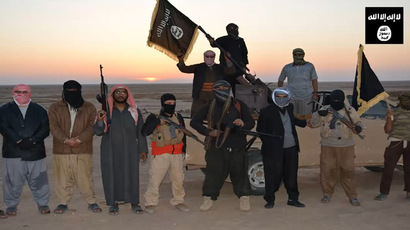Iraq’s PM Maliki gives up his post, supports his successor Abadi

Iraq’s Nouri al-Maliki has announced his resignation from the post of Prime Minister of the embattled state in a speech on state television. He said that he supported his nominated replacement in the post, Haider al-Abadi.
Nouri al-Maliki has surrendered his power in face of the ISIS onslaught in Iraq and now supports his replacement, Haider al-Abadi that was nominated by the country's president on Monday.
“It is my duty to fix any mistake that may impede on constitution process,” Maliki said in his televised address to the nation, cited by Al Arabiya.The outgoing PM defended his time in office claiming that he has “opened up Iraq to the world” and has chosen from the beginning to “distance” himself from using force.
“I am not the only target, all of Iraq is,” he said claiming that ISIS’ power stems from the Syrian conflict. “The Syrian conflict paved the way to re-define the political map of the region,” Maliki stated.
“I withdraw my candidacy for PM in favor of Abadi to safeguard the unity & stability of Iraq, political process,” Maliki wrote on his Facebook page before the address.
Maliki has been facing pressure to step aside for a new leader who would be capable of countering Islamic State militants – the biggest security threat in the country.

"Maliki will withdraw the complaint against the president and will back the prime minister designate," his spokesman Ali Mussawi told AFP earlier.
Al-Maliki has been struggling for months to stay for a third four-year term as PM of the country after the fall of Saddam Hussein in 2003. He has been widely criticized for his pro-Shiite stance that resulted in the marginalization of the Sunni minority, leading to wide discontent in the country.
The pressure from criticism reached a boiling point at the start of the week when the Shiite political alliance backed Haider al-Abadi, to replace him. On Monday Iraqi President Fouad Massoum nominated al-Abadi to form the next government and has given him 30 days to do so. Maliki initially refused to step aside saying that such a move violated the constitution.
The international community also applied vast pressure on Maliki to step down by endorsing the new PM. The Security Council on Wednesday urged Iraq's new PM to form an inclusive government to preserve state integrity and ease sectarian tensions.
Haider Al-Abadi, in a UN Security Council statement, is asked “to work swiftly to form such a government as quickly as possible and within the constitutional time-frame” and called on “all political parties and their supporters to remain calm and respect the political process governed by the Constitution.”
“We urge him to form a new cabinet as urgently as possible, and the US does stand ready to fully support a new and inclusive Iraqi government,” US Secretary of State John Kerry said Tuesday.
The UN has declared the highest level of emergency in Iraq on Wednesday as the ISIS advance threatens minority groups in the country. Thousands of mainly Yazidi refugees left Mount Sinjar and fled to a camp just over the border in Syria that the International Rescue Committee is setting up.
Earlier on Tuesday, the UN Human Rights office said it received “verified reports" that the Islamic State is systematically hunting down members of minority groups who remain trapped in areas under their control and giving them the ultimatum, “convert or die,” stated Christof Heyns, UN Special Rapporteur.
Last week it was reported that extremists from the Islamic State have killed at least 500 people, including women and children, Iraqi officials said. Some of the victims were buried alive.
In addition, ISIS militants have taken over large parts of the country and now control at least 5 oil fields and almost half of Iraq's wheat crop.
The Islamic State has gained significant ground in both Syria and Iraq after its initial assault on the city of Mosul in mid-June. The group has since declared the creation of an Islamic state, or caliphate, straddling the Iraq-Syria border. Its presence continues to hang over the Iraqi capital Baghdad, although it seems to have halted after capturing key Sunni areas. ISIS has also been gaining ground in the autonomous region of Kurdistan.
The group is famous for torture, public punishments and executions of anyone so much as daring to deviate from the strict form of Islam it propagates.














